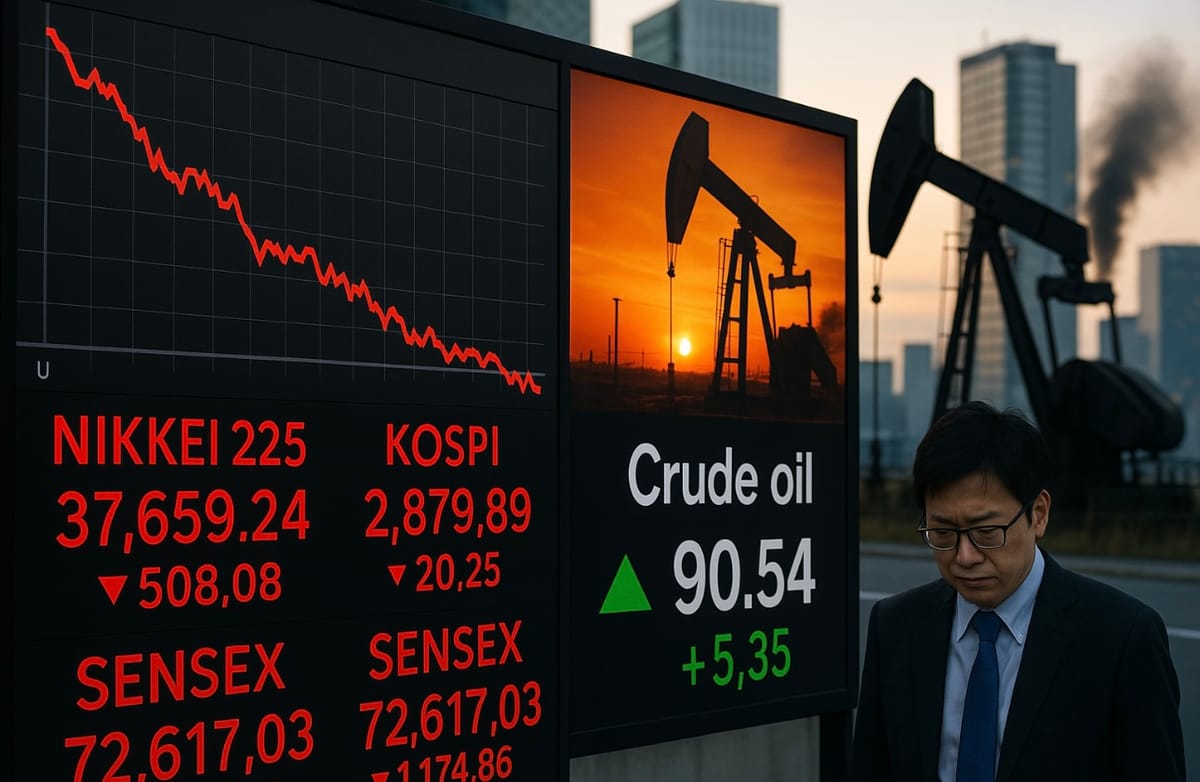Asian Markets Slide as Oil Prices Surge After Israel Strikes Iran
Asian markets plummet and oil prices soar after Israel’s strike on Iran triggers geopolitical tensions and global economic fears.

The latest geopolitical tensions in the Middle East have immediately shaken Asian markets and global oil prices. An Israeli airstrike on Iranian territory in the early hours of Friday sparked panic across Asian stock exchanges, pulling down key indexes like the Nikkei 225, Kospi, and India’s Sensex. Meanwhile, crude oil prices surged sharply, fueling new concerns among global investors about inflation risks and the potential for broader economic disruption.
Immediate Impact on Asian Markets
At the opening of trading, Asian markets tumbled. Japan’s Nikkei 225 fell 1.2% to 37,721.64, while South Korea’s Kospi dropped 0.7% to 2,900.14. India’s Sensex also plunged, losing more than 1,100 points or 1.8% in just a few hours. The biggest declines hit energy and export sector stocks, though some oil-related companies remained relatively resilient amid the turmoil.
This pressure highlights how sensitive Asian markets are to geopolitical upheaval in the world’s main oil-producing regions. Not only equities, but several Asian currencies also weakened. Amid capital outflows, investors shifted their funds to traditionally safer assets like gold and US government bonds.
Oil Prices Surge, New Threats for the Economy
The spike in oil prices became a central concern. US crude (WTI) jumped 8.2% to $73.61 per barrel, while Brent crude climbed to $74.88 per barrel. This marks the largest increase since the start of the year, driven by fears that supply from the Gulf could be disrupted if the conflict escalates.
Analysts warn that if Iran retaliates, any disruption in the Strait of Hormuz—the main route for global oil shipments—could push prices to $90–$120 per barrel. Major importers like India are expected to suffer most, particularly through currency depreciation and surging inflation due to higher energy costs.
Global Market Response and the US Position
In contrast to Asia, US stock markets edged higher. The S&P 500, Dow Jones, and Nasdaq each gained slightly, buoyed by lower-than-expected US inflation data. This positive sentiment spurred hopes of a Federal Reserve rate cut, even as the threat of war continues to hang over the markets.
Global investors flocked to safe-haven assets like gold, the Japanese yen, and Swiss franc. The 10-year US Treasury yield also dropped to around 4.31%, signaling strong demand for low-risk instruments amid heightened uncertainty.
Conflict Origins and Escalating Geopolitical Risk
This latest Israeli strike targeted strategic sites in Iran and reportedly killed a senior military official. Israel stated that operations would continue “as long as necessary,” while Iran threatened to deliver “severe punishment” in retaliation. The United States clarified that it was not directly involved but urged all parties to exercise restraint.
This dynamic places the world in a new phase of uncertainty. Market players are closely monitoring Iran’s potential response, including the possibility of closing the Strait of Hormuz or broader military escalation that could have global market repercussions.
Outlook and Economic Implications
Looking ahead, market direction will depend heavily on the conflict’s development. Continued escalation could trigger further oil price spikes and equity market declines, possibly leading to a global economic slowdown. Asian countries, as the largest oil importers, face the highest risks, especially regarding inflation and economic growth.
For investors and businesses, the situation calls for extra caution. Adjusting portfolios toward safe-haven assets and active risk monitoring are essential steps amid high global market volatility.





Comments ()